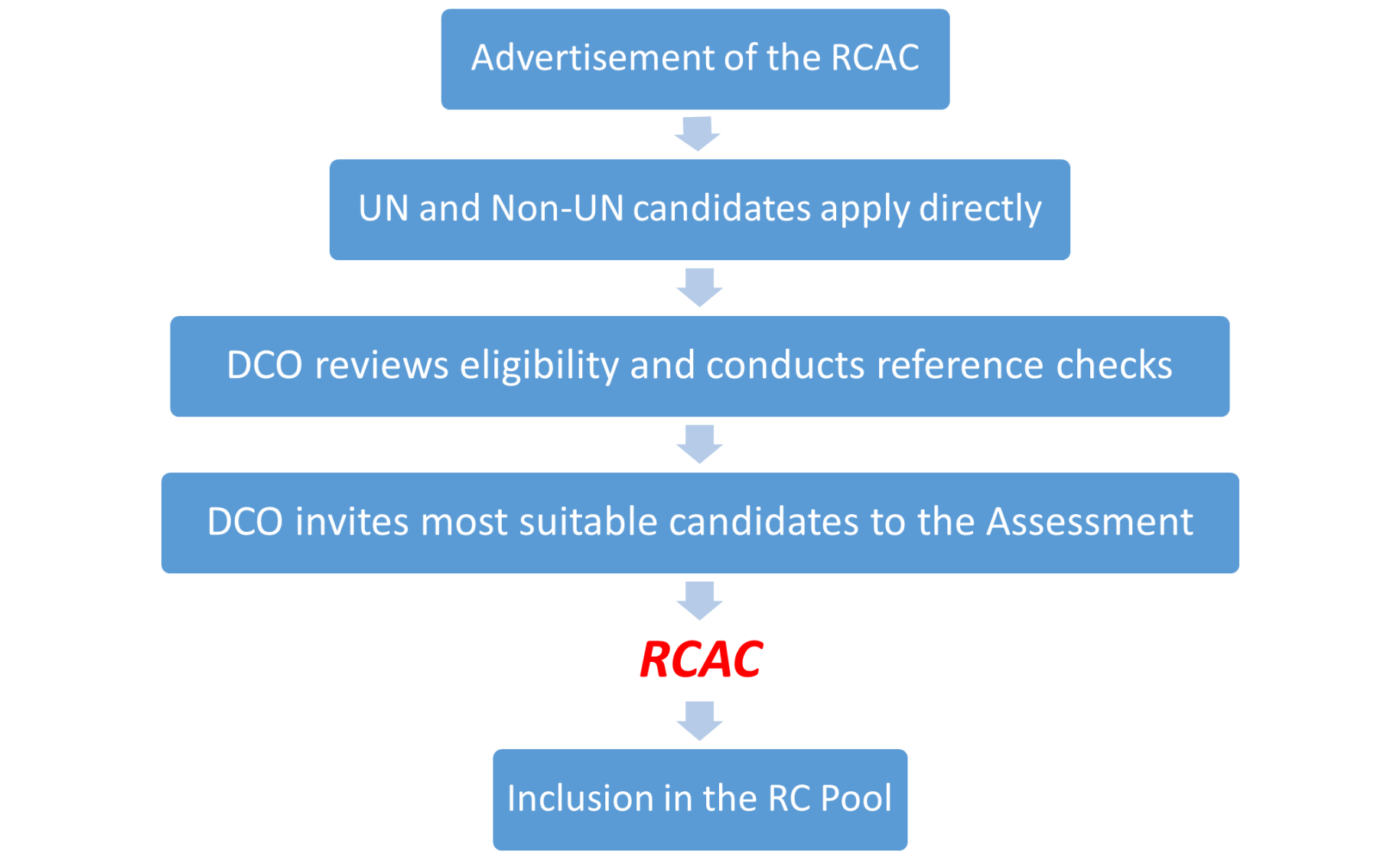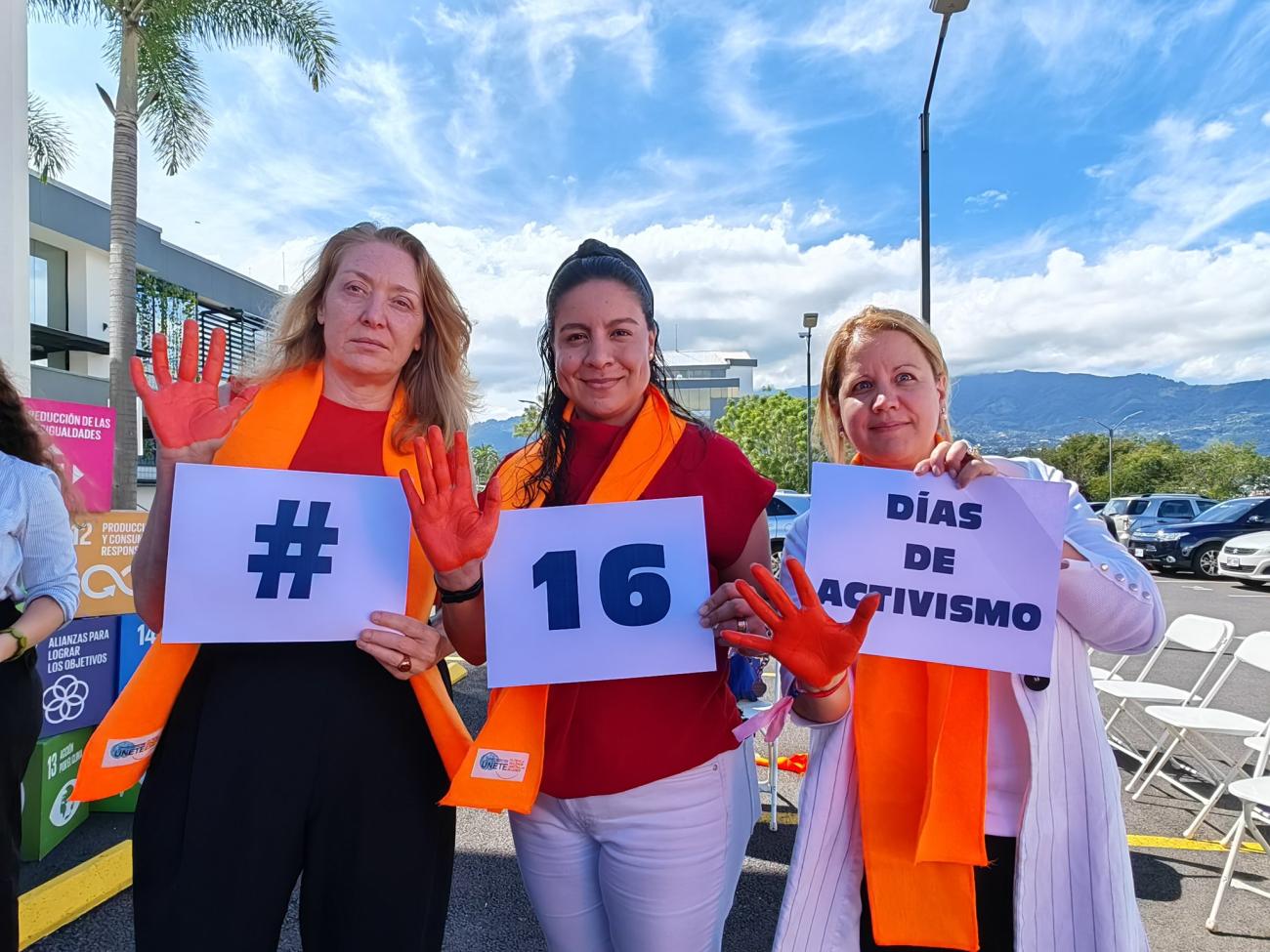The Resident Coordinator Assessment Centre (RCAC) is the assessment mechanism to enter the Resident Coordinator (RC) Pool.
The RCAC measures the competencies articulated in the RC Leadership Profile while providing a simulation of situations RCs and RC/HCs may be confronted with.
Membership of the RC Pool is a pre-requisite for applying to RC positions.
Who can apply for the RC Pool?
Candidates who wish to apply for the RC Pool must meet the following eligibility criteria :
- Master’s degree – or equivalent post graduate qualification – in development studies, international relations, political science, economics, social sciences, human rights, law or closely related fields (for otherwise suitably qualified candidates, a first level university degree in combination with two additional years of qualifying experience may be accepted in lieu of an advanced post graduate university degree);
- Be at the P-5 level or above, or at an equivalent level of seniority outside of the UN system;
- A minimum of 15 years of substantive experience and results in leadership roles at the international level with a focus on development, human rights, rule of law, peace-building or humanitarian action including at least five years of cumulative senior representational experience at the country level (e.g. Country Director, Representative, Head of Office) preferably outside of one’s own country*;
- Fluency in English;
- Rating of “Fully met performance expectations” or equivalent, in the last two performance appraisals, where applicable;
- Proficiency in the competencies of the Resident Coordinator Leadership Profile;
- Ability to serve for at least one tour of duty (i.e. 5 years) before reaching the mandatory age of separation (65 years) by the time of application;
- Readiness and willingness to deploy within 6 months following the RCAC;
- Commitment to serve in any country at the request of the Secretary-General;
- Candidates will not be considered if they have committed violations of international human rights law, violations of international humanitarian law, sexual exploitation, sexual abuse, or sexual harassment, or if there are reasonable grounds to believe that they have been involved in the commission of any of these acts.
*Country-level experience is defined as experience working directly with governments and other national and international partners on a day-to-day basis in situ, and does not include visiting missions, or work performed in headquarters locations.
Desirable criteria include:
- Senior-level representational experience;
- Experience serving on UN Country Teams/Humanitarian Country Teams, or equivalent;
- Experience in inter-agency coordination, or equivalent;
- Experience in developing strategic partnerships with governments, intergovernmental entities, private sector and/or donors;
- Working knowledge of another official UN language and/or of a local language where RCs serve;
- Membership to and/or satisfactory completion of a leadership development programme such as the Resident Coordinator/Humanitarian Coordinator (RC/HC) Talent Pipeline, Senior Women Talent Pipeline or equivalent is an advantage.
How are candidates to the RC Pool selected?
DCO normally advertises a call for applications once a year.
Application to the RC Pool does not require the endorsement by a UN entity; both UN staff and candidates external to the UN system can apply directly. .
Once applications are received, they are reviewed by DCO against the eligibility and desirable criteria. Through the review process, all selected candidates will undergo reference checks.

How are candidates assessed?
Candidates are assessed against the competencies of the RC Leadership Profile through a set of simulation exercises which put them into situations RCs and RC/HCs might be confronted with. Each exercise assesses several of the competencies listed below:
Systems Thinking
- Analyzing complex environments: Seeks learning and insight from a wide variety of sources, recognizing multiple points of view as well as inherent biases and prejudices; makes sense of large amounts of often incomplete, contradictory and fluid information; analyzes and understands the underlying organizing principles as well as the patterns, relationships, linkages, interactions and dependencies among the various components of their environment; detects and interprets early signals, emerging trends and multidimensional risks; understands the power dynamics (political, gender, economic, and social) within an environment, identifying who benefits and who is disadvantaged by them; continuously re-examines data, assumptions and insights in light of changing circumstances.
- Identifying pathways for impact in complex environments: Strategically positions themselves and the Organization in order to add most value; provides a vision and develops strategies to translate policies into action and achieve impact in multidisciplinary and politically complex environments; identifies entry points and pathways to achieve the greatest impact; leverages stakeholders within and outside the Organization, tailoring their engagement modality (e.g. quiet or public advocacy, influencing, persuasion) to achieve maximum impact; navigates sensitive political environments by demonstrating political acumen and an understanding of the complex interrelationships among political issues and actors without compromising UN values and principles; continuously scopes the external environment to identify opportunities for transformational change and impact.
Co-creation
- Building trust: Easily connects with a broad and diverse array of stakeholders across organizational, sectoral, political, gender, generational, cultural, socio-economic and other boundaries; treats all staff and interlocutors with respect and dignity; continuously and proactively engages with all stakeholders, including those marginalized, those who don’t speak up, critics and challengers, to understand their values, interests, needs, priorities and concerns; establishes an environment of empathy and psychological safety, where colleagues and stakeholders can raise issues without fear; deals with stakeholders in a fair, impartial and transparent manner; demonstrates consistency and reliability, honouring commitments made.
- Facilitating collective action: Engages stakeholders as co-creators of a common vision and direction; cultivates stakeholders’ commitment by generating and nurturing excitement and enthusiasm for the shared vision and objectives; articulates compellingly why collective results matter and how achieving them can help stakeholders achieve their own objectives; continuously and proactively seeks out the opinions and views of all stakeholders, listening attentively and with curiosity to a diverse range of views, withholding judgement; facilitates inclusive group processes to jointly analyze problems and co-create solutions; facilitates alignment among stakeholders, translating their interests and concerns to each-other, resolving conflicts among them and helping them reach shared decisions.
Focusing on impact
- Driving results: Builds and fosters momentum around delivering results, inspiring others to achieve and exceed goals and expectations; hold themselves and others accountable for the achievement of results; actively seeks to improve efficiency, effectiveness, reduce overlaps, and/or provide better return on investment while upholding and defending human rights and all other UN values and principles; makes decisions quickly based on fluid and incomplete information even in high-risk situations, taking due account of the safety and security of UN personnel; when faced with changed circumstances or roadblocks, swiftly readjusts priorities and plans and/or finds creative ways to achieve planned results; balances actions that deliver short-term impact (“quick wins”) with strategies to create long-term systemic transformation (“game changers”); institutionalizes the regular monitoring, reporting and sharing of results and learnings to stakeholders and partners, to provide visibility on progress, identify challenges and obstacles, and adjust strategies accordingly; empowers individuals and teams to achieve results through collaboration, continuous feedback, and selfreflection, holding them accountable for outcomes and addressing under-performance.
Driving transformational change
- Fostering Innovation: Challenges assumptions, thinks in innovative ways and disrupts habitual ways of thinking and doing business through critical thinking, reframing, and context shifting; promotes and supports continuous experimentation, piloting and prototyping, as well as investment in inclusive innovation; generates awareness and enthusiasm for the innovative and creative ideas of others, supporting them from concept to implementation and celebrating and rewarding success; creates and enables breakthrough moments by launching big-picture challenges and encouraging visionary aspirations; promotes a healthy awareness of risk in innovation and encourages learning through failure; uses real-time data to identify novel solutions for the ever-changing challenges being faced.
- Leading change: Promotes foresight and early warning of strategic risks to anticipate and proactively manage change; provides a vision for change, establishing linkages between the change being sought at country level and that taking place at other levels of the Organization; communicates the vision for change in compelling ways, sharing personal insights, setbacks, and lessons learned where necessary; continually and consistently sponsors change, modelling the desired behaviours, providing incentives for adopting them and celebrating progress; builds engagement for change by creating a “listening environment” to understand and address stakeholders’ perceived threat, fear or resistance to change; nurtures an environment of continuous improvement and change in both people and business processes, through systematic listening, learning and adapting.
What happens after the RCAC?
Candidates who successfully pass the RCAC are included in the RC Pool and are eligible to apply for RC and RC/HC vacancies.















